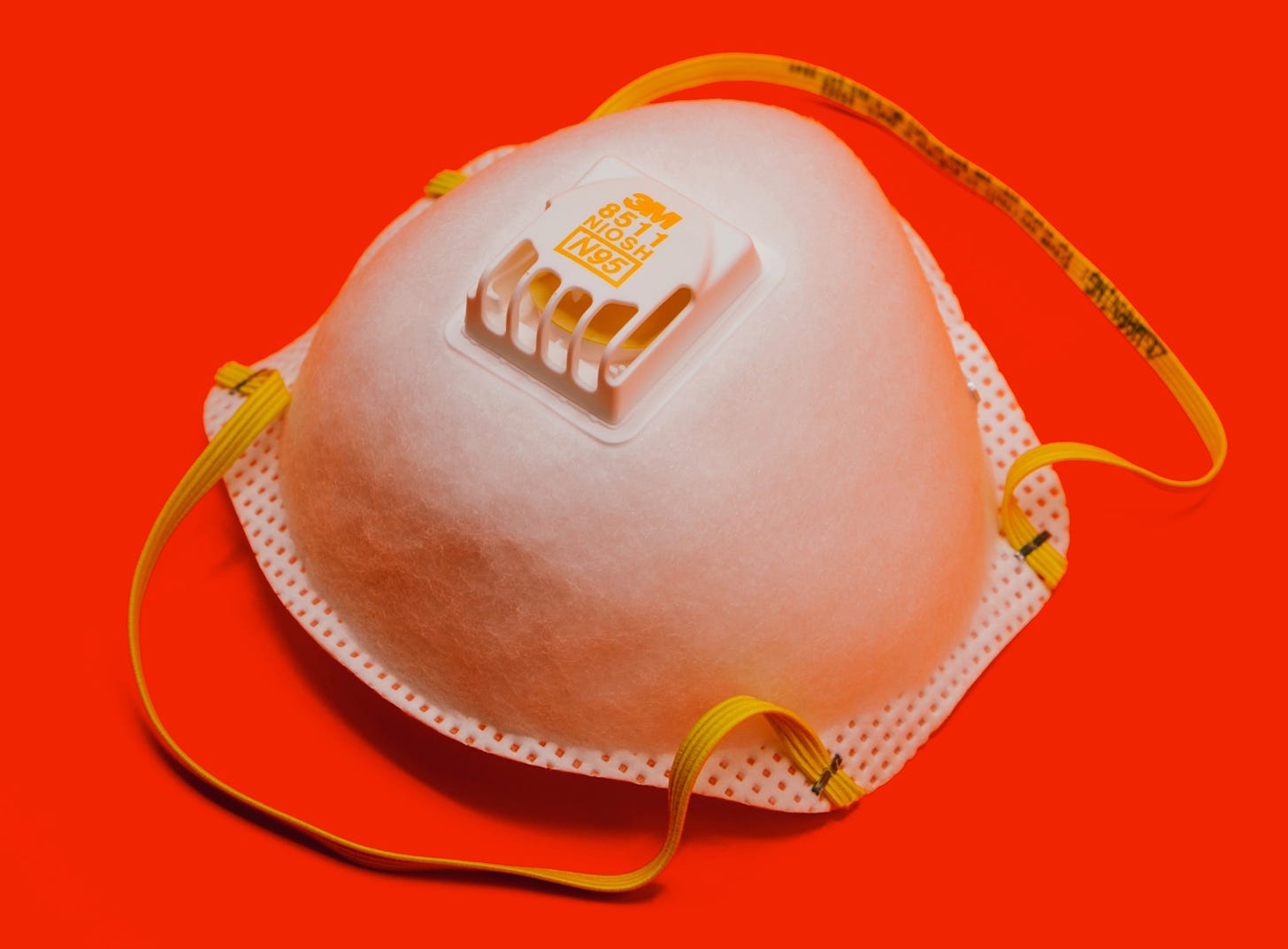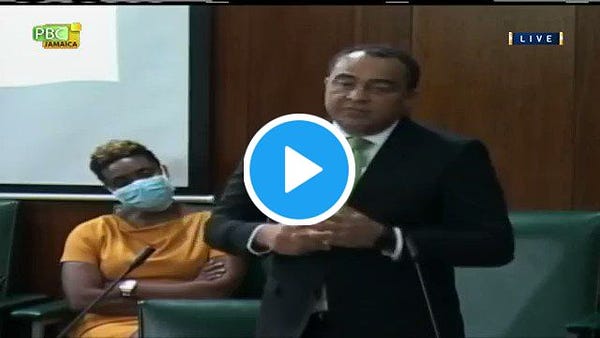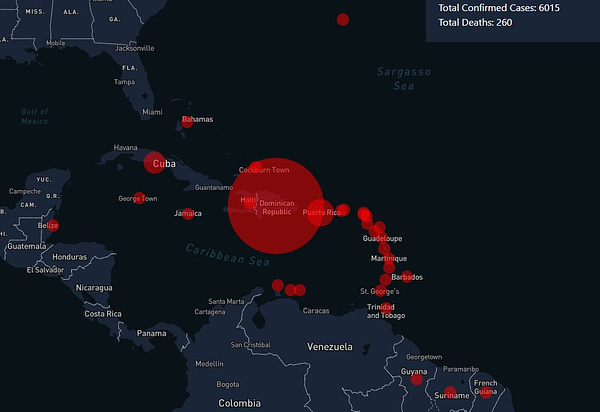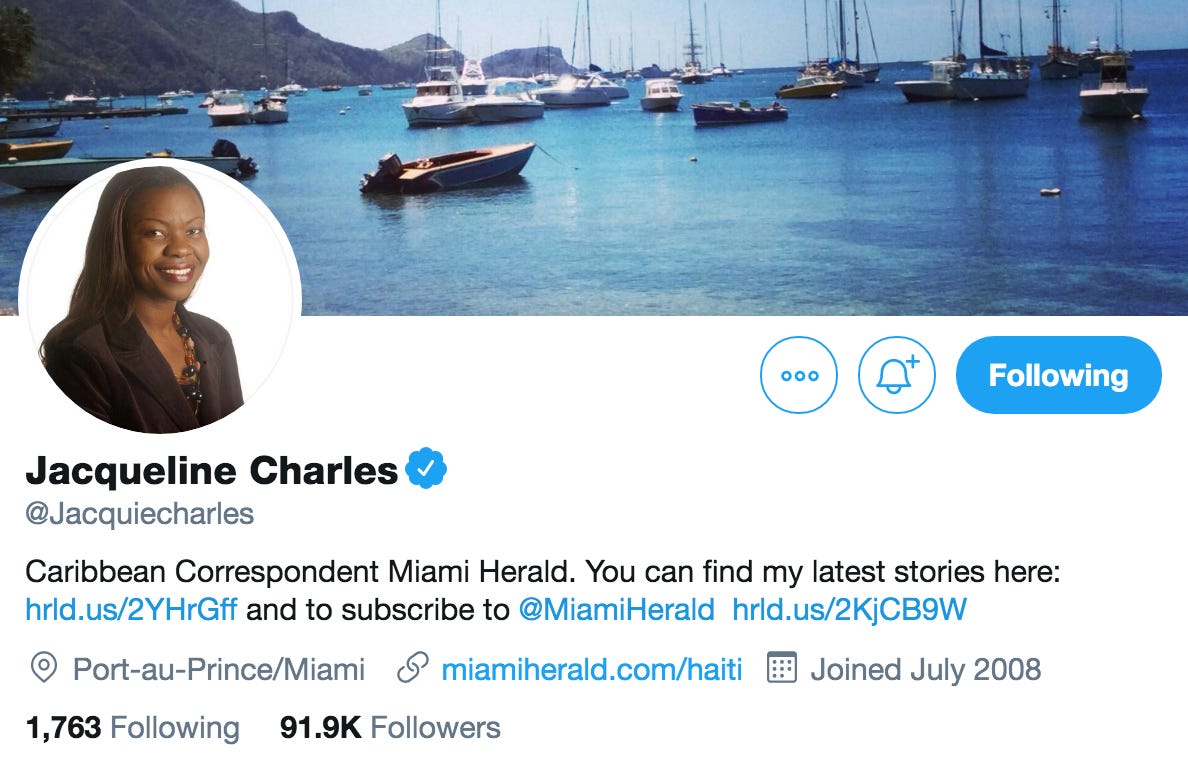The (undercovered) Caribbean and COVID-19
U.S. Customs and Border Protection are blocking personal protective equipment from several nations, a journalist and software engineer create a live data tracker map, and more.
Speak Patrice Presents: Coronavirus News for Black Folks is an independent, ad-free newsletter that aims to empower our community by sharing coronavirus (COVID-19) news and stories as they relate to the Black Diaspora.
Please consider (1) clicking that itty bitty ❤️at the top of this email next to my name to “like” us, (2) subscribing, and (3) supporting this newsletter by sharing it with friends and family.
Help me help you :)
If you have a minute, could you please take this quick *anonymous* survey to help make this newsletter informative and valuable? Thank you!
Welcome to a special edition of “The Black Folk Bulletin.” Experts have projected a surge in COVID-19 cases and deaths throughout the Caribbean in the coming weeks. And yet there’s (relatively) very little consistent data from and in-depth news focused on the pandemic and its resounding impact on the the region. So today’s “Black Folk Bulletin” is dedicated solely to COVID-19 coverage in the Caribbean…
MUST-READ STORY:
Caribbean Nations Can’t Get U.S. Masks, Ventilators For COVID-19 Under Trump Policy
— by Jacqueline Charles and Alex Harris, Miami Herald

(Photo by visuals on Unsplash)
In the past week, three Caribbean nations —the Bahamas, Cayman Islands and Barbados —have all had container loads of personal protective equipment purchased from U.S. vendors blocked from entering their territories by U.S. Customs and Border Protection.
“We are talking about personal protective equipment; we’re talking about durable medical devices and gloves, gowns, ventilators as well,” Bahamas Health Minister Dr. Duane Sands told the Miami Herald. [continue reading]
MAIN TAKEAWAY:
A LITTLE-KNOWN ACT — “The blockade experienced by Caribbean nations followed President Donald Trump’s April 3 signing of the little-known Defense Production Act. While the order gave the federal government more control over the procurement of coronavirus-related supplies, it also allowed the administration to ban certain exports.”
FOR EXAMPLE — “A shipment of 20 ventilators purchased by a philanthropist” were barred from Barbados, while eight ventilators and 50,000 masks were “produced and purchased in the U.S. and removed from a Grand Cayman-bound ship in Miami.”
AN UPCOMING SPIKE — “The number of [COVID-19] cases has grown to more than 4,000 across 33 Caribbean countries and territories, with over 185 deaths, according to the latest available statistics compiled by the Caribbean Public Health Agency,” with a reported spike expected by in the coming weeks.
BLOCKING/NOT BLOCKING — When questioned about the blocking of PPE (personal protective equipment) exports, President Donald Trump said at a press briefing this week: “We’re not blocking. What we’re doing is we’re making sure; we don’t want drugs in our country, and especially with the over 160 miles of wall, it’s getting very hard to get through the border. They used to drive right through the border like they owned it, and in a certain way, they did.”


TWO SPECIAL SHOUT-OUTS:
They didn’t see it, so they created it…
Frustrated with the Caribbean being excluded from many international COVID-19 data sets, Trinbagonian journalist Clydeen McDonald teamed up with Vincentian software engineer Janique-ka John to create their own live tracker based on local case reporting: Caribbean COVID Map.
“What Janique-ka John and I hope to do here is help the press and members of the public contextualize what has been fairly localized coverage across the region,” McDonald tweeted. “While numbers are just numbers, this helps us judge the Caribbean on our terms even without international media coverage.”


Most of the international Caribbean COVID-19 coverage I’ve seen has come from one woman…

While searching for stories to include in today’s newsletter, there’s one byline (the line in a newspaper that names the article’s writer) that kept coming up: Jacqueline Charles, the Emmy Award-winning Caribbean correspondent at Miami Herald, the same publication where she began her journalism career as an intern in 1986.
Born on Grand Turk Island of the Turks and Caicos and raised in the United States by a Haitian mother and Cuban-American stepfather, Charles spent the earlier parts of her career covering impoverished areas of Miami before expanding to the Caribbean region. Her coverage of the catastrophic Haiti 2010 earthquake earned her the NABJ Journalist of the Year award and made her a Pulitzer Prize finalist. I recommend following Charles on Twitter for daily, rigorous updates on what’s happening in the Caribbean, both with respect to the average citizen and the region’s top officials and leaders.
“I’m always striving to tell people something that they didn’t know,” she said in a previous interview.


MORE TOP STORIES:
Coronavirus Is Hurting The Caribbean’s Tourism Economies. Why No One Is Offering A Bailout
— by Jacqueline Charles, Miami Herald
“Whether Caribbean nations get the help they are seeking, they should brace themselves for higher unemployment, which could double based on projections of zero cruise tourism for the rest of the year, and a roughly 80 percent drop in tourism this year compared to 2019,” Caribbean economist Marla Dukharan said. [continue reading]
Despite U.S. Warnings, Cuba’s Medical Diplomacy Triumphs In The Caribbean During Pandemic
— by Nora Gámez Torres and Jacqueline Charles, Miami Herald
“‘We are friends of all and enemies of none. We are an extremely vulnerable micro state, and have little option but to accept assistance from all nations,’ Antigua and Barbuda Prime Minister Gaston Browne said. ‘Those who would like us to do otherwise should undertake to fill the breach.’
The political message is clear, observers of the region say: Contrary to what the U.S. has been trying to demonstrate by having the doctors chased out of Brazil, Bolivia and other Latin American nations, Cuba’s medical brigades are still needed and appreciated.”
No Longer Immune? Latin America & Caribbean See Significant Rise In COVID-19 Cases
— by Tim Padgett, WLRN
“Haiti has reported about 35 coronavirus cases and just reported its first death last week. But we already know from the earthquake there a decade ago that it does not have anywhere near the healthcare infrastructure to deal with a serious COVID-19 outbreak. […] The entire country has only 62 hospital ventilators for coronavirus patients. So yeah, we have to watch this now.” [continue reading]
Coronavirus: ‘Situation Is Going To Get Worse Before It Gets Better,’ Health Group Says
— by Jacqueline Charles, Miami Herald
“Pan American Health Organization (PAHO) ‘has been concerned about the response to COVID-19 as seen in Nicaragua,’ Dr. Carissa Etienne, director of PAHO, said. ‘We have concerns for the lack of social distancing, the convening of mass gatherings. We have concerns about the testing, contact tracing, the reporting of cases. We also have concerns about what we see as inadequate infection prevention and control.’” [continue reading]
Coronavirus: A Warning To Latin America And The Caribbean To Dramatically Increase Covid-19 Testing
— by Diego Alburez-Gutierrez, José Manuel Aburto, and Marília R. Nepomuceno, The Conversation
“Singapore and South Korea performed more than 7,000 tests per million inhabitants. In Latin American and Caribbean countries the average is around 612 tests per million, according to our calculations of the available data. Countries such as Bolivia were conducting as little as 52 people tests per million in early April.” [continue reading]
Colonialism Made Puerto Rico Vulnerable To Coronavirus Catastrophe If Washington Keeps Ignoring The US Territory, It Could Spell Disaster.
— by Chris Gelardi, The Nation
“Decades of exclusion from the full benefits of federal programs has chipped away at its hospital network. Hurricanes Maria and Irma in 2017, earthquakes this year, and the federal government’s lackluster response to both have further damaged the territory’s health infrastructure. The island’s debt crisis and the swooping in of vulture funds has stripped Puerto Rico’s government of budgetary autonomy, which could hamper its ability to fund its emergency response.”
Trini-Born New York Nurse Dies From COVID
— by Carolyn Kissoon, Trinidad Express Newspapers
“The COVID-19 coronavirus has claimed the lives of three more Trinidad and Tobago nationals living in New York, including a registered nurse. At least 10 Trinidadians have died in New York in recent weeks, due to complications from the virus.” [continue reading]
Stars Wyclef Jean, Sean Kingston, Sting And Others Plea For Jamaica's Healthcare Workers
— by Mike Levine, ABC News
“The event featured some of Jamaica’s most popular celebrities, including Olympian Usain Bolt and musicians such as Sean Kingston, Sean Paul, Shaggy, and Ziggy, Damian and Stephen Marley, the Grammy award-winning sons of the late Bob Marley.” [continue reading]
14-Day Quarantine For Alorica Staff After 33 Positive COVID-19 Tests
— by Lynford Simpson, Loop Jamaica
“With just 65 tests completed on the 787 employees of the Portmore-based Alorica call centre, 33 are positive for COVID-19. Thirty-one of those were confirmed on Tuesday. The frightening statistic has led the Ministry of Health and Wellness to order Alorica's nearly 800-strong staff to quarantine at home for the next 14 days.” [continue reading]
Elderly Couple Recounts Trials Navigating St. Catherine Lockdown
— by Christopher Serju, The Jamaican Gleaner
“We had a little hold-up, but nothing compared to what was happening with the toll road. We were stopped, and we were asked [why we were traveling] and we explained that she had an important lab test to be done, and he said, ‘Okay’, and then another half chain from there, another policeman stopped us and asked again the purpose of our travel.” [continue reading]
COVID-19 Coronavirus In Paradise: How The Caribbean Is Being Hit
— by Nina Shapiro, Forbes
“Pamela Berkowsky, Former Pentagon and U.S. Virgin Islands Official, notes that, while island ‘communities plan year-round for natural disasters, it is unclear whether the infrastructure can handle this, especially in such fragile economies dependent largely on tourism.’ In addition, according to Berkowsky, the islands will be ‘months behind the economic recovery curve,’ and ‘when other [economies] are back, Caribbean recovery will lag.’” [continue reading]
Dominican Republic Delays Presidential Vote Over Coronavirus Concerns
— by Scott Neuman, NPR
“Until about a month ago, there were only a handful of cases in the country of about 10.6 million people. However, since then coronavirus infections have spiked, reaching as high as 271 new cases in a single day by late last week.” [continue reading]
Haiti to reopen textile factories despite coronavirus fears
— by Andre Paultre and Sarah Marsh, Reuters
“Haiti’s decision may seem premature given health experts warn the outbreak has yet to peak in Latin America and the Caribbean. But its economic needs are also greater than most.
“The question was whether to die of hunger or of coronavirus,” said Georges Sassine, the head of Haiti’s Industrial Association.” [continue reading]
Undocumented Caribbean Expats At Greatest Risk Of COVID Job Loss – Yvette Clarke
— by Judana Murphy, The Jamaica Gleaner
“‘These families,’ Caribbean-American Congresswoman Yvette D. Clarke said, ‘are at risk of unemployment and food insecurity.’ Families have been relying on clergy to be a lifeline for the diaspora and for those who do not belong to congregations, their help has been coming from non-profit organisations.
‘We are finding ways to get funding to employers of companies with 500 or less employees, sole proprietors, people who are in the gig economy, people who are self-employed, or they own a mama-and-papa establishment.’” [continue reading]
FEEL GOOD NEWS:
Fighting Virus One Mask At A Time
— by Antoinette Connell, Nation News (Barbados)

Theresa Chandler, 67, “estimated that she has made close to 500 so far but as her mask-making material runs out, that will be it for the time being. The material and elastic were donated by Abeds but, explained Chandler, the store was now closed.
‘I am very happy to do it. It is needed and I know it is greatly appreciated. We have to be our brother’s keeper and I am happy to contribute and do my bit.’” [continue reading]
Jamaicans in Japan
Japan-based members of Petit Square, a matcha powder founded by Jamaican-born entrepreneur Monique, showed their support of the island and encouraged their loved ones abroad to social distance to help flatten the curve. “We stand in solidarity with our fellow Jamaicans,” read the photo’s Instagram caption.
While working on today’s newsletter, I had a very difficult time sourcing reports and stories from and about the Caribbean and COVID-19, which reaffirms the need for projects like Caribbean COVID Map, newsrooms that have several reporters like Jacqueline Charles, and even the existence of this newsletter. If you know of additional publications, journalists, and other platforms and people who can help others stay up-to-date on what’s happening in the Caribbean, then please drop them in the comment section below!
ALSO: A big thank you to Sam, Rob, Akua, and Rebecca at the Inner Hoe Uprising podcast for shouting out the newsletter in their most recent episode. Give it a listen — they cover everything from the FDA banning blood donations from men who have sex with men, thoughts on navigating solo sex while you’re home with kids, the beauty of volunteering, and more.
Stay safe, take care, and one love ✊🏿💗





